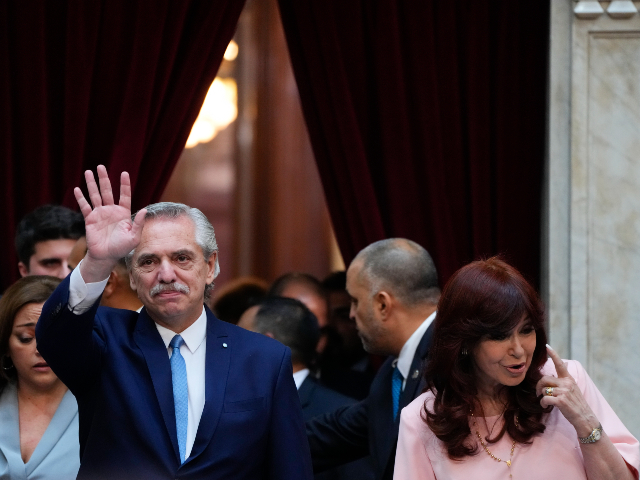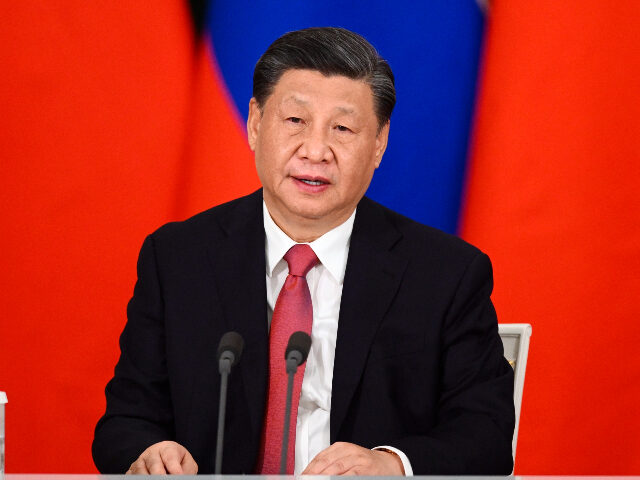The pressure and influence of communist China on Argentina’s leftist government has increased in recent weeks, as China seeks to take advantage of Argentina’s economic and social distress to take control of its strategic sectors, according to a report published by the Argentine news website Infobae on Thursday.
The report states that Chinese diplomats, led by China’s ambassador to Argentina Zou Xiaoli, are demanding shorter deadlines for the takeover of a large part of Argentina’s energy sector and are urging the Argentine government to grant them management of the country’s canals and navigable rivers, which would grant the communist regime sizeable control of the region’s grain trade.
Argentina, under the leftist government of president Alberto Fernández, has adopted a notoriously pro-China stance, joining China’s predatory Belt and Road Initiative (BRI) in February 2022 during Fernández’s official visit to Beijing — where Fernández laid a wreath to honor communist mass murderer Mao Zedong.
Sabino Vaca Narvaja, the Argentine ambassador to China, has openly praised the Chinese Communist Party, scolding those who “demonize communism.”
Shortly after joining BRI, both countries signed a Memorandum of Accession to grant Argentina a two-part Chinese financing package for “strategic infrastructure works.” The first part of the package consists in $14 billion in financing, granted under the mechanism of the “Strategic Dialogue for Economic Cooperation and Coordination” between China and Argentina. The second part of the agreement represents a $9.7 billion financing package under the BRI framework.
Following another meeting between Chinese dictator Xi Jingping and Argentine president Alberto Fernández in November, China agreed to provide Argentina with a $5 billion currency swap deal to boost the cash-starved Argentine Central Bank’s dwindling foreign currency reserves.

Argentine President Alberto Fernandez waves as he arrives to the Congress to address the nation with Vice President Cristina Fernandez at the annual opening legislative session in Buenos Aires, Argentina, Wednesday, March 1, 2023. (AP Photo/Natacha Pisarenko)
According to Infobae’s report, a meeting between Zou Xiaoli and the Vice President of Argentina, Cristina Fernández de Kirchner, is expected to take place in the next few weeks, during which both countries will discuss the final concessions details pertaining to the $8 billion Atucha III nuclear power plant that China agreed to build in 2022. China has allegedly availed themselves of the recent power rationing and blackouts in Argentina to strengthen its lobbying power and push for an expedited construction of the 1,200 megawatts nuclear power plant.
The Infobae report further states that during the upcoming meeting between the Chinese diplomat and the Argentine vice president, both countries will discuss granting China the exploitation of the Paraná-Paraguay waterway, a more than 3,400 kilometer long natural river transport corridor that extends through the Paraná and Paraguay rivers that allows for continuous navigation between the ports of Argentina, Brazil, Bolivia, Paraguay and Uruguay.
In addition to being considered one of the most important water reserves in the world, the waterway holds great importance for development and economic purposes for the region. If granted access, China would have under its control a large part of the grain trade of Argentina and South America, a strategic area for the whole region.
In recent years China has also extended its military influence on Argentina, securing a foothold on the South American nation.
In 2017, during the government of “center-right” president Mauricio Macri, China finished building a military space station in Argentina’s Patagonia region. The operations of the 16-story antenna base are kept under secrecy, with China claiming that the station’s work is for “peaceful space observation and exploration.”
In 2019, Pentagon officials warned about the potential threats that the base represented, expressing their growing concerns that the Chinese could use it to monitor and potentially target U.S. and allied satellites.
According to Argentina’s embassy to China, president Fernández is considering the purchase of JF-17 “thunder” fighter jets from China — even though Fernández had previously said his government would not buy any military aircraft in the near future.
China is one of the countries that backs Argentina’s continued claim of the British Falkland Islands — a South American archipelago that is part of British territory, which Argentina claims as its own under the Spanish name Islas Malvinas. Even though Argentina claims the islands as their own, more than 90 percent of the Falkland Islands population chose to remain part of the United Kingdom in 2013.

COMMENTS
Please let us know if you're having issues with commenting.